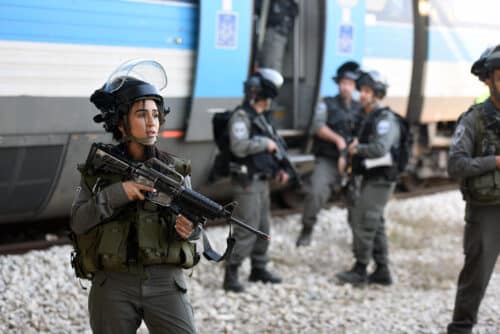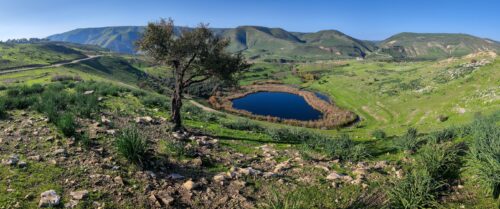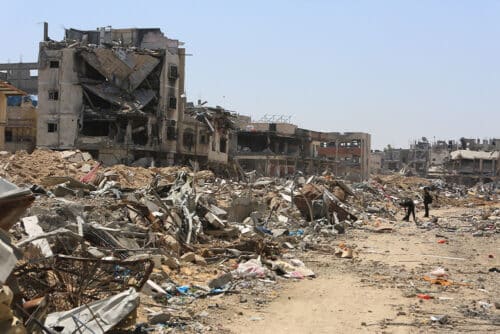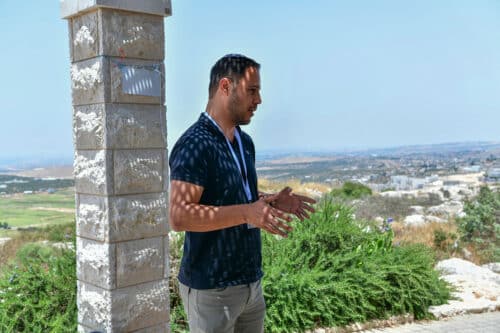You are already used to seeing the leaders of the IDSF Movement speaking about Zionism, values and security in the news studios, Knesset committees and the pre-military preparatory programs. Soon you will also be able to meet them at schools, with the “Borders of Agreement” curriculum that was recently approved by the Ministry of Education.
The person behind this unique curriculum is Colonel (res.) Itzik Ronen, a senior researcher in the IDSF who studies the field of national resilience in-depth, with an emphasis upon teenagers. We sat down with Ronen in order to hear about the curriculum he is proposing, what makes it different from other curriculums offered to teachers and what is important for teenagers to learn before they complete 12 years of education.
“Teenagers are unfamiliar with the broader story of the establishment of the State of Israel in the Land of Israel”
Ronen (52) Was born in Nesher and grew up in the Krayot. At age 18 he was drafted to the Armored Corp. and has since served in a variety of command posts. Ronen took part in wars and operations and his final posting was as commander of the Harel Armored Brigade. After 25 years in the security apparatus, Ronen turned to teach civics to high school students, after undergoing conversion of academics teaching. He graduated magna cum laude from the College of Management with a bachelor’s degree in economics, graduated from Haifa University with a master’s degree in national security, and has recently completed his doctorate which dealt with the field of national resilience and the impact of mandatory conscription upon the individual’s social-cultural perception. In between, he managed to publish three books.
Itzik, as a man who has dedicated his life to security, and whose academic background began in economics, how did you enter the field of education?
Had you told me when I was 18 years old that one day I would be part of the educational world, I would have said you were delusional. But the truth is that the army brought me there: It was during my military service that I understood how important it is to influence the next generation. Beyond the IDF’s security work, it is important to note that it also engages in educating the young. In the IDF, you see how the biblical verse “you shall tell your son” is implemented in practice.
Since your discharge you have met many teenagers. Do you feel that they are connected to the importance of maintaining Israel security?
I can tell you from my personal experience as well as after conducting research on the matter: teenagers today are unaware of the social-security challenges in the state as they are, and are unfamiliar with the broader story of the establishment of the State of Israel in the Land of Israel. Among other things, this has led to a situation whereby after high school the teenagers are required to decide where they would like to get drafted to. Their choice is based upon limited knowledge, with matching results: They prefer serving in branded units such as cyber and intelligence rather than significant service in field units, the units in which “Israelis of all stripes” encounter with every variety of cultures and ethnic origins in our society.
Do you think the situation can be changed?
One of the central goals of the “Borders of Agreement” curriculum that the Ministry of Education recently approved was to intensify awareness among teenagers to the importance of significant service in the IDF, out of an understanding that the IDF is not merely an army that maintains the security of the state but also a first rate social mechanism for reducing societal gaps and creating solidarity.
“When a student is exposed to the truth, he acquires important knowledge”
For practical purposes, what are the students actually learning throughout the curriculum?
The curriculum goes in-depth into three areas. The first area is Zionism. You can say that the curriculum refines the importance of service in the IDF with a Zionist, security and social outlook in today’s Israel. The second area concerns national duty, meaning the purpose of service in the IDF, which serves as the people’s army. The third area is civic duty, meaning the impact of military service on assimilation into Israeli society.
What are the skills that the students will receive as part of the “Borders of Agreement” curriculum?
The curriculum provides three separate skills. First and foremost, is the deepening of the idea of a people’s army in a Jewish, democratic state. The second skill is increasing the students’ fluency in the security challenges faced by the state of Israel and their interface with social aspects, an issue that unfortunately is severely lacking among teenagers. The third skill is familiarity with the impacts of military service upon integration into Israeli society.
There are many curricula for schools. Why should teachers and headmasters choose yours specifically?
At present, the educational system does not make the social-security situation as it is accessible – There is currently no platform in the system that imparts this knowledge to the students. Take for example a high school senior – what does he know about the social-security situation in Israel after 12 years of education? Not from Facebook or TikTok, but a true and deep understanding of what is happening in the field, in Lebanon, Gaza, Samaria, the Negev and what are the implications of this on our security. This is where we also leverage the advantage of the IDSF Movement, as experienced officers with many years of service in these areas and an in-depth familiarity with the existing security and social challenges.
What advantage do members of the IDSF have in teaching these contents?
There is great importance for people in the field, who have seen the security reality with their own eyes. They can convey the facts as they are to those teenagers, directly. Not from the position of opinion, but rather from the position of factual truth. When a student is exposed to the truth, he acquires important information.
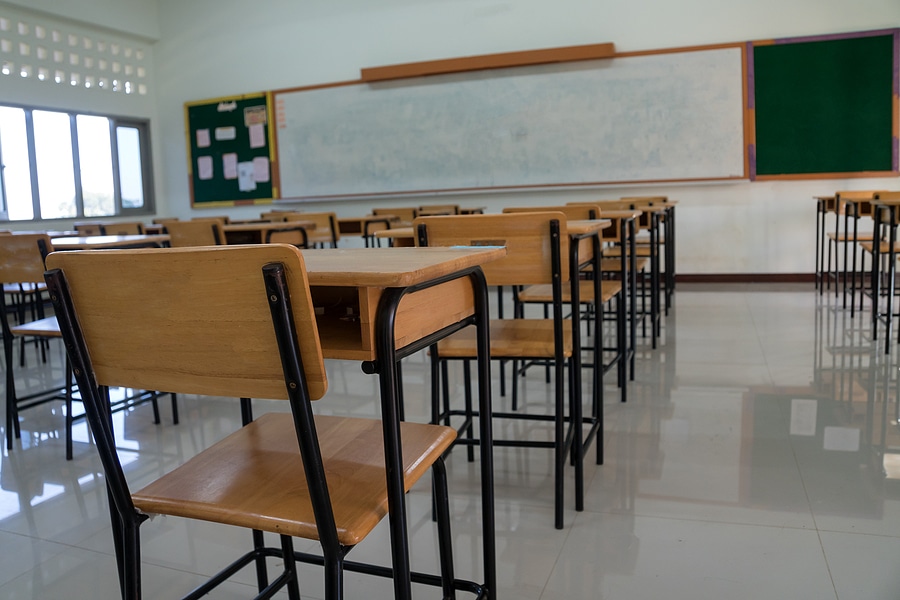
We’re not here to replace the teacher
in your estimation, would teachers and headmasters prefer this curriculum over other, perhaps less explosive curricula?
I know that today’s teachers want to engage in this. And it’s true, there were cases in which teachers tried to wade into these issues, stumbled over these or other nuances in explosive issues and things got out of hand. This is precisely the reason we built the “Borders of Agreement” curriculum after much in-depth thought.
Wouldn’t it be better for the teachers themselves to teach this knowledge to the class?
As someone who is engaged in both security and teaching, I can tell you that teachers have expertise in the disciplines that they teach; history, Bible, civics, language and the like. They have the ability to navigate a classroom discussion practically and unemotionally. But not all teachers have the knowledge and expertise in security and social issues, and then the discussion can slide into emotional realms that are not derived from facts on the ground. Our advantage, the IDSF, is that we have expertise from the field, and we have witnessed the factual truth. It is important to state – we’re not here to replace the teacher. Many of the proposed curricula include some guest speaker, where the teacher stands aside and is not part of imparting knowledge. Our curriculum proposes cooperation between the classroom teacher and the IDSF experts, so that each individual brings his knowledge, tools and expertise to the table.
Teachers are not allowed to express a political opinion. Can you really engage in this topic without venturing into politics?
We come to the schools with apolitical security information. I present to the classroom the situation along the Lebanese border, I don’t say anything Netanyahu or Bennett or Gantz have said, that’s of no interest. What do I do? I talk about the example of the Golan Heights and its strategic importance. After presenting the facts there is a discussion in class, a debate. The classroom is divided into groups and a representative of each group presents its position. Thus, a spirited debate takes place, which the teacher navigates and at the end of which the classroom is given the opportunity to decide who among the groups, who presented their position, was more convincing. It is the students who debate among themselves and who received insights on the various issues, with politics not factoring in in any way.
What are your expectations of the curriculum?
I would like to see a variety of schools choosing the curriculum. Schools from Jerusalem, Eilat, the border of Gaza, Tel Aviv, who are interested in signing up for “Borders of Agreement”. In this manner, we can create a shared language between the various parts of Israeli society. No less importantly, we are currently speaking about the profile of the “high school graduate” in the educational system – who is this student who completes 12 years of education. My vision is to place another small stone into this mosaic.
If I am a parent, teacher or headmaster who is interested in signing up for this curriculum, what should I do?
The curriculum is in the list of the approved programs by the Ministry of Education within the framework of APF: the administrative flexibility program. The number of the curriculum is 11084 under the name “Borders of Agreement”.


